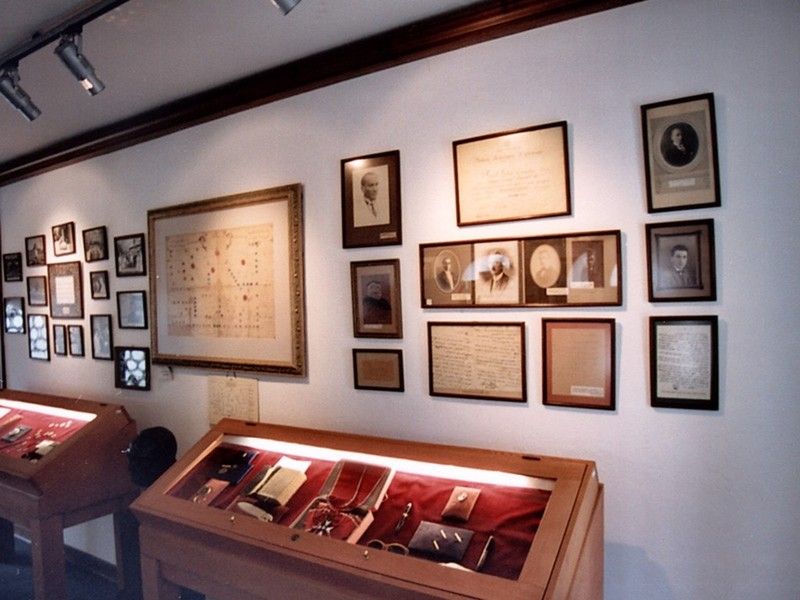GPS : 41°00'31.5"N 28°58'03.5"E / 41.008739, 28.967636

PHOTOGRAPHS ALBUM
MERZİFONLU KARA MUSTAFA PASHA MADRASA
The grand vizier of Mehmet the fourth, Merzifonlu Kara Mustafa Pasha was executed after his failure in the second Vienna siege. His son commissioned architect Hamdi to finish the complex in 1690. The complex consists a madrasah, a mescit (small pray room), a primary school, a sebil (water dispenser), shops, a water reservoir and a graveyard. In 1957 the shops, the sebil and graveyard were displaced on the opposite side of the road.
Merzifonlu Kara Mustafa Pasha is the person that introduced coffee to the Europeans. He had 600 bags of coffee beans with him during the siege to be used by his men. After his defeat he left the bags in front of the gates of Vienna. A local entrepreneur started serving coffee in in his liquor shop and although the Pasha was unsuccessful in entering Vienna, his coffee was.
Merzifonlu Kara Mustafa Pasha Public Fountain protruding as if it were challenging the construction plan, the public fountain of Merzifonlu Kara Mustafa Pasha Social complex, built In Çarşıkapı in 1684, is one of the biggest, the most beautiful and the latest of the classical public fountains.
INSTITUTE AND MUSEUM
Merzifonlu Kara Mustafa Paşa Madrasa of the complex is a research institute, which was established on behalf of the famous poet, Yahya Kemal Beyatlı (1884 - 1958). There is a small cistern under the complex. The museum was opened to guests in 1961. In 2009, the Infant’s School of Merzifonlu Kara Mustafa Paşa Madrasa had been restored and become Yahya Kemal Museum of today.
The museum is a two-storey building. At the base floor, there are personal library of Yahya Kemal, some postcards and letters in his handwriting, his identity card, passports, bank documents, notebooks, shaving set and bottles of cologne and the first edition of all of his books.
At the top floor, you can see the suitcase he used when travelling, personal things like pen and glasses, photos from different times of his life, photographs signed by Atatürk, his family tree, his table and chair he used at Park Otel and golf equipments.
Yahya Kemal was born Ahmet Agah on December 2, 1884 in Skopje, then in the Kosovo Vilayet of the Ottoman Empire. He wrote under pen names such as Agah Kemal, Esrar, Mehmet Agah, and Süleyman Sadi. He came from a prominent family, whose roots could be traced back to the Ottoman court, and he was educated at various private schools.
As he was about to start his higher education, severe disagreements between his parents kept him away from school for some time. When he tried to return to school, he was turned away because it was too late into the semester. His absence from school coincided with the oppressive regime of Sultan Abdülhamit II (reigned 1876-1909), and Yahya Kemal got involved various anti-regime movements. To avoid getting arrested, he went to Paris in 1903.
During his time abroad, he met other exiled Turkish intellectuals, politicians and writers. He traveled extensively in Europe, and was exposed to various cultures. He developed a fondness for literature and was influenced by the French romantic movement. He eventually decided that he wanted to write poetry, and he first studied the historical works of the French Parnasse poets. Consequently, he sought out a way to revitalize Turkish Divan poetry in order to create smooth and pure poetic lines.
Yahya Kemal’s poetry is influenced by music, because he composed with concepts borrowed from Turkish music. While explaining the inner rhythm of the poetic language, he used musical terms such as Tınnet, which denoted the musical value of the sounds or words that pace a line of poetry. For Yahya Kemal this was the only method for creating internal harmony. He states, "Poetry is akın to music. Poetry is not made of couplets, but poetry is melody."
For the most part, he was consistent and practiced what he preached; in his poetry, music and meaning go hand-in-hand. The central thought that runs through Beyatlı’s poems and prose is that the Turkish nation is fashioned with the sweat and tears of the heartland. Even his love poems featured stylized historical and cultural values.
Another peculiarity that can be perceived in Beyatlı’s poetry is the almost feminine sensibility that he displayed towards Islam. His explanation for this is that his father spent very little time with him, and that his first lessons in religion came from long hours spent talking with his mother. Yahya Kemal grew up in a household where hymns and chants were sung, where values of the past were kept alive, hence in his poems he used religion and esthetics together.
When he returned to Istanbul in 1912, Yahya Kemal was already known as a master poet, and the change of regime in the country provided him with opportunities in various high level governmental positions. Beyatlı became a member of parliament for the Urfa (1923-1926), Yozgat (1934), Tekirdağ and Istanbul (1943) provinces. After the Surname Law came into effect in 1934, he adopted the surname "Beyatlı". In 1926, he was appointed ambassador to Poland, where he remained until 1929.
He was ambassador to Portugal between 1930 and 1932, also acting as Envoy Extraordinary and Minister Plenipotentiary in Madrid. In 1947, he was appointed as the first Turkish ambassador to Pakistan. After this assignment, his health got progressively worse, and he returned to Turkey in 1949. His medical condition was never properly diagnosed and his health was never fully restored. He died on November 1, 1958 in Istanbul, and was buried in the Aşiyan Asri Cemetery.
LOCATION SATELLITE MAP
WEB SITE : Yahya Kemal Institute And Museum
MORE INFO & CONTACT
E-Mail : istfetihcemiyeti@ttmail.com
Phone : +90 212 638 61 45
Fax : +90 212 517 4168
These scripts and photographs are registered under © Copyright 2017, respected writers and photographers from the internet. All Rights Reserved.
No comments:
Post a Comment